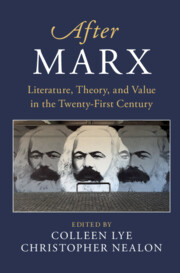Book contents
- After Marx
- After Series
- After Marx
- Copyright page
- Contents
- Contributors
- Acknowledgments
- Introduction
- Chapter 1 Black Marxism and the Antinomies of Racial Capitalism
- Chapter 2 Eco-Criticism and Primitive Accumulation in Indigenous Studies
- Chapter 3 Screening Insurrection: Marx, Cinema, Revolution
- Chapter 4 Marxist Ecology and Shakespeare
- Chapter 5 There Is No “More Commodification”: Periodizing Capitalist Transformation
- Chapter 6 The Irreconcilable: Marx after Literature
- Chapter 7 The Rise and Fall of the English-Language Literary Novel since World War II
- Chapter 8 Literature and the State
- Chapter 9 Post-Soviet Aesthetics
- Chapter 10 Lu Xun’s Literary Revolution in Chinese Marxism
- Chapter 11 Latin American Literature and Dependency Theory Today
- Chapter 12 Industry Culture: Labor and Technology in Marxist Critical Theory
- Chapter 13 In Service to Capital: Theater and Marxist Cultural Theory
- Chapter 14 Hidden Abodes and Inner Bonds: Literary Study and Marxist-Feminism
- Chapter 15 Poetry and Revolution
- Index
- References
Chapter 10 - Lu Xun’s Literary Revolution in Chinese Marxism
Published online by Cambridge University Press: 12 March 2022
- After Marx
- After Series
- After Marx
- Copyright page
- Contents
- Contributors
- Acknowledgments
- Introduction
- Chapter 1 Black Marxism and the Antinomies of Racial Capitalism
- Chapter 2 Eco-Criticism and Primitive Accumulation in Indigenous Studies
- Chapter 3 Screening Insurrection: Marx, Cinema, Revolution
- Chapter 4 Marxist Ecology and Shakespeare
- Chapter 5 There Is No “More Commodification”: Periodizing Capitalist Transformation
- Chapter 6 The Irreconcilable: Marx after Literature
- Chapter 7 The Rise and Fall of the English-Language Literary Novel since World War II
- Chapter 8 Literature and the State
- Chapter 9 Post-Soviet Aesthetics
- Chapter 10 Lu Xun’s Literary Revolution in Chinese Marxism
- Chapter 11 Latin American Literature and Dependency Theory Today
- Chapter 12 Industry Culture: Labor and Technology in Marxist Critical Theory
- Chapter 13 In Service to Capital: Theater and Marxist Cultural Theory
- Chapter 14 Hidden Abodes and Inner Bonds: Literary Study and Marxist-Feminism
- Chapter 15 Poetry and Revolution
- Index
- References
Summary
In what ways was China’s literary modernism central to its Marxism? Despite Chinese revolutionary culture’s many twists and turns from class struggle to economic reconstruction, Marxist intellectuals in China have consistently identified Lu Xun (1881–1936), a modernist writer who never joined the CCP and dismissed its revolutionary literature as an “unfortunate confusion of guns with words,” as having drawn the blueprint of the country’s communist future. Instead of reexamining the writer’s political alignment with CCP leaders or the extent and accuracy of his knowledge of Marx, this chapter takes up the perplexing question of Lu Xun’s Marxism by recasting his modernist experimentations with irony, rhetorical displacement, and metafictional excess as the construction of a materialist aesthetics centered on disposable populations that appear, at first, either independent of capital–labor relations or anterior to primitive accumulation in the beginning years of China’s traumatic incorporation into the world capitalist system.
- Type
- Chapter
- Information
- After MarxLiterature, Theory, and Value in the Twenty-First Century, pp. 161 - 175Publisher: Cambridge University PressPrint publication year: 2022



